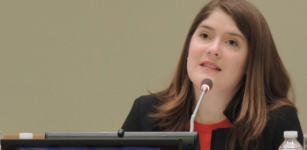#ProtectJournalists: An Interview with Reporters Without Borders’ Delphine Halgand

Journalists often expose harsh realities to the general public, and this can rub certain people up the wrong way. Whether it’s reporting on corrupt politicians, investigating organised crime, or revealing the repressive practices of military forces: those targeted are rarely thankful for the exposure.
And if journalists do reveal these truths, they can sometimes pay the ultimate price.
Take the Balibo Five. Back in 1975, these Australians journalists were over in East Timor right before the Indonesian invasion. They were shot dead by military officers trying to prevent them from reporting an attack on the town of Balibo, carried out by Indonesian security forces.
US strikes on journalists
On April 8 2003, a US tank fired a shell into the Palestine Hotel in Baghdad, killing two journalists. The attack on this well-known journalist haunt took place as the US forces invaded the Iraqi capital.
Journalists who witnessed the attack rejected the Pentagon’s claim that the tank had been fired upon first from within the hotel.
Earlier that same day, the US launched attacks on the Baghdad offices of both Al Jazeera and Abu Dhabi TV. A correspondent from Al Jazeera died in the airstrike.
The rising death toll
But things are getting much worse for investigative reporters. The last five years have been the deadliest on record. Since 2006, 780 journalists have been murdered around the world, and last year there was a total of 78 killed.
Impunity has become the norm, with full justice only being achieved in 3 percent of all cases of journalists being murdered over the last decade.
The list goes on
Daud Ali Omar, a producer for a pro-government radio station in Somalia, was murdered along with his wife in the south-central city of Baidoa in April 2015. His assailants were never identified.
Nineveh Reporters Network cameraman Jalaa al-Abadi was kidnapped in Mosul by Islamic State fighters in June 2015. A month later, the militants shot him dead.
And 32 journalists and media workers were slaughtered near the town of Ampatuan in Maguindanao province in the Philippines in November 2009.
The group were traveling to report on a local vice mayor who was filing for candidacy in the next general elections. A convoy of 100 men stopped them on their way, spraying them with bullets.
None of the perpetrators have ever been brought to justice.
Reporters Without Borders
Along with a worldwide coalition of media outlets, journalists and NGOs, Reporters Without Borders has launched the #ProtectJournalists campaign. They’re calling for the appointment of a special representative to the United Nations secretary general for the safety of journalists.
The organisation acknowledges that despite various UN resolutions being implemented relating to the protection of journalists, these have had little impact on the ground. So they’re pushing for a system that will provide some concrete results.
An advocate at the frontline
Delphine Halgand is the director of the Washington, D.C. office for Reporters Without Borders. She’s been working there since December 2011.
It has recently been announced that Ms Halgand will be awarded the James W Foley American Hostage Freedom Award for the work she’s carried out on behalf of American journalists that have been taken hostage.
Sydney Criminal Lawyers® spoke with the US director of Reporters Without Borders Delphine Halgand about the need for the establishment of greater protections for journalists and press freedom.
Reporters Without Borders are running the #ProtectJournalists campaign to end the violence against reporters around the globe. My first question is why are journalists being subjected to so much violence, and in some cases being killed?
Journalists have always been under attack. But the last five years have been the most dangerous for them, with the highest number of journalists killed around the world. The numbers are pretty concerning.
But what I’d like to say, is that when we’re talking about journalists being killed, we’re talking about the right of every citizen to know what’s happening. It is so important to defend journalists and to defend press freedoms, because we defend the freedom of all of us to know what’s happening.
So when you kill a journalist, you kill the right of people to know what’s happening.
You’ve prompted my next question there. Last year there were 78 reported journalists killed worldwide. And as you said, the last five years have been the deadliest on record for journalists. Why’s the violence getting worse?
There’s many reasons actually. One is now, when there is a war on the ground, we’re seeing an information war at the same time.
In the past, journalists were needed by the parties involved in the conflict to get their message out. But now when you have a war, each group involved in the conflict have their own propaganda tool. So they don’t want independent journalists to report what’s really happening.
ISIS has its own TV, radio, magazine and internet campaigns. The Syrian government has its own propaganda media. And we’ve seen the same in the Ukraine.
Or we observe the same in Latin America, where, for example, a drug cartel or the corrupt local politicians don’t want independent reporting, so that’s why they’re targeting journalists more and more.
There’s cases like this happening throughout the world. But which countries are the most dangerous for journalists to operate in today?
So Syria, Iraq, Yemen, are the three most dangerous. But we have seen a dangerous increase of killings in countries like Brazil and India. And this is very concerning because it’s new, and those countries are supposed to be democracies, where journalists are protected.
So this is a concerning new trend.
Do you know why in a country like India it’s getting worse?
What we have observed is that it was mostly linked to a journalist who reported on local corruption issues. And this was the same in Brazil.
So it’s the impunity for crimes against journalists that can definitely encourage local authorities, or local corrupt groups to kill journalists, because they know that nobody will go after them, and it’s not so risky to kill a journalist.
Now via the #ProtectJournalists campaign you’re hoping to establish a special representative to the United Nations secretary general for the safety of journalists.
But Reporters Without Borders have stated that previous UN resolutions related to the protection of journalists, have had few concrete results on the ground.
What would be the main function of this special representative that you’re proposing? And how would they actually go about establishing concrete changes to enforce international laws?
So you’re right. What we have observed is there is pretty strong international law standards for the protection of journalists, but the reality on the ground is that it doesn’t change.
So that’s why we have been advocating for the creation of a very high level UN mandate – a special representative – because we believe that only someone who has real political weight and the capacity to act quickly can make change happen on the ground.
To give you an example, we believe that the UN itself could do a better job when there’s a UN peacekeeping operation on the ground to protect journalists. And also the UN should do a better job to put pressure on the member states to respect their duties.
Last September, we were contacted by a group of Afghan journalists that we knew. There were 26 journalists in a village that was encircled by the Taliban. And they called us telling us that when the Taliban arrived in the village that they would kill them.
So we tried to convince the UN forces, which were nearby, to help the journalists escape. But it was not possible, because it’s such a huge administration, etc. So it was really frustrating to know that there were UN forces very close by and there were 26 journalists being threatened to be killed.
And there was nothing to be done, because there were no people higher up in the UN that could say, “No guys, you have to go now.” So that’s what we believe a special representative could do: act quickly in cases of emergency.
Finally, we found a way for these journalists to escape in trunks of cars, etc. So that’s an example.
I’m glad to hear they made it out.
Yes.
On February 23, the secretary general of Reporters Without Borders Christophe Deloire, along with the executive director of the Committee to Protect Journalists Joel Simon, met with the UN secretary general Antonio Guterres to discuss the appointment of a UN special representative for the safety of journalists.
How did this meeting go? What was established?
It went very well. I’m saying that also because I can compare that with the last meeting that we had with former UN secretary general Ban Ki-moon.
Really, Antonio Guterres is deeply, personally convinced of the importance of press freedom for the defence of all of freedom. And he’s a man of action, so he’s determined to get the UN to deliver what they should do. So actually he wants to act very quickly. And we discussed some ideas about how they could act quickly.
We’re waiting to hear back on what they can or can’t do, and we’re hoping to have a clear idea by next week.
But we’re working on very concrete and immediate action.
And on a personal note, last month it was announced that you’ll be presented with the James W Foley American Hostage Freedom Award for the work you’ve done on behalf of American journalists taken hostage.
How did you feel about that announcement? And can you tell us a little bit about the work you’ve done that’s gained you that recognition?
I was really, really touched to be recognised for this award. I’m personally very moved, because I see myself as a little Frenchie, who arrived in the US and did whatever she could to help. So to receive such prestigious recognition is a big honour for me.
I believe it’s mostly due to the work I’ve done around Jason Rezaian or Austin Tice, and the way we succeeded to move the attitude of the US media in regards to their own journalists, when they’re missing or taken hostage.
We built the first US media campaign on Austin Tice for example, when it’s not a habit in the US to do such a thing when a journalist is missing.
So I guess that was my main contribution that could explain this award.
Well congratulations on that.
And I do have one more question. Reporters Without Borders have been running the #ProtectJournalists campaign for some time now and you’ve met with the UN secretary general. But journalists are still out there being killed for reporting the truth.
So what’s your next move?
It’s always different moves at the same time. When we’re pushing the UN, we’re also continuing to push any politician who will get a journalist arrested. So it’s never all in the same basket.
We have to continue to push and to fight at every level. Sometimes it’s just as effective to have a phone call with a politician in Burundi, as it is to have a phone call with the UN secretary general. So you have to keep pushing every front at the same time.
Delphine thanks so much for taking the time out to speak with us today.
Thank you.
And continued success with the #ProtectJournalists campaign.
Why thank you so much.
I hope that Australia could join the group of friends. Because now there’s a group of ambassadors in New York, who work on this issue and are pushing Guterres.
It would be great if Australia could join.







